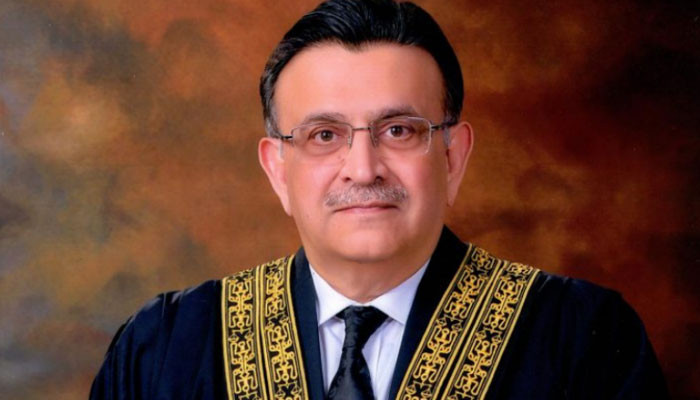Chief Justice of Pakistan (CJP) Umar Ata Bandial
Image source Geo tv
ISLAMABAD: Chief Justice of Pakistan (CJP) Umar Ata Bandial on Tuesday hinted at reviving corruption references being closed by accountability courts after recent amendments to the National Accountability Ordinance (NAO).
“You never know these references may be revived,” observed the CJP, pointing towards the National Accountability Bureau’s (NAB) Additional Prosecutor General (APG) Mumtaz Yousuf and asking him to keep the record of these references in safe custody and in an “organised and digitalised manner”.
The CJP was heading a three-judge Supreme Court bench, which had taken up a challenge by PTI chairman Imran Khan to the amendments in NAB laws made in August.
The CJP recalled the APG was earlier directed to file the particulars of the references that have been returned by accountability courts to NAB after the amendments.
The court asked the APG to submit the record in one week.
The Supreme Court explained that the record being sought should also include the amount involved in addition to names of the accused in the references being returned by trial courts to NAB.
“The NAB should collate, tabulate, physically preserve and digitise the record for safe storage,” Justice Bandial emphasised. The bureau should continue to bring to the apex court’s notice all the references being returned by accountability courts, he said.
NAB will also report to the court the particulars of inquiries and investigations which were undertaken by it, but suspended or stopped after the amendments, the CJP said.
Senior counsel Makhdoom Ali Khan, who represented the federal government, requested the court to mention in its order that NAB must submit a complete record of all cases.
Exemptions and exceptions
The CJP said a question was being discussed in the media and in parliament that a certain class of individuals, for instance businessmen, should not be prosecuted since NAB laws were harsh. “We need to strike a balance and the idea is to do the right thing.”
Justice Bandial, however, agreed with an observation that criminal sanctions alone would never ensure honest governments.
He cited the example of obligations under the Financial Action Task Force (FATF) provisions, saying they might be harsh but at the same time certain exporters had conceded that they helped by laying out regulations. The CJP regretted that amendments to NAB laws were passed without any debate in parliament.
Makhdoom Ali Khan recalled that before these amendments, a series of ordinances were promulgated, asking the petitioner to explain what “grave necessity” had led to the hasty promulgation of ordinances to amend the accountability law.
Justice Syed Mansoor Ali Shah said he wanted to know about “those who have been taken away from NAB’s domain and whether judges are exempted or not”.
Senior counsel Khawaja Haris Ahmed, who represented the petitioner, argued that judges did not come under the domain of NAB laws, but Justice Shah observed that except for armed forces personnel, there was no explicit mention about exemption for judges.
“I could be asked to answer why I delivered a certain judgment,” the judge remarked.
Khawaja Haris recalled a reference over increase in drug prices, saying that the accused had to return Rs73 million after entering into a plea bargain. He also cited the example of six references in the rental power plants case, recalling that the accused deposited Rs8.68 billion in the exchequer.
“But public money will be lost forever in such cases after the amendments.”
Published in Dawn, October 19th, 2022

